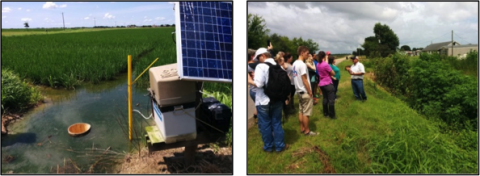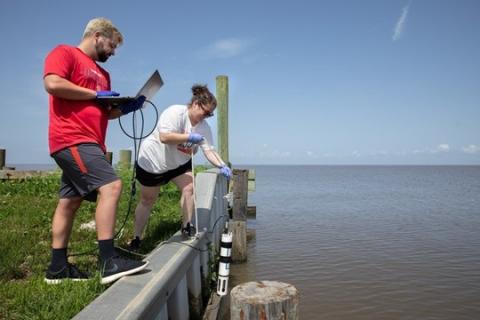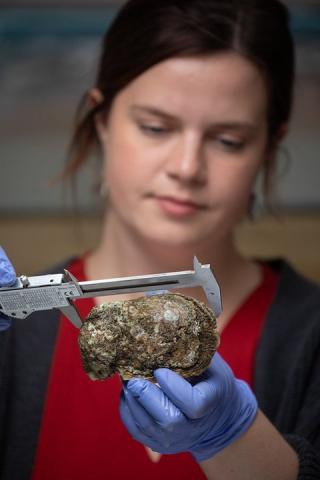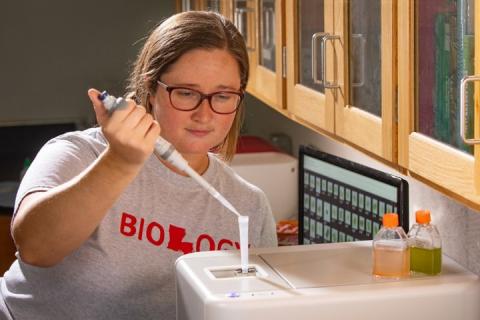Research Projects
- Flood Forecast Portal
- Community-Scale Flood Monitoring
- Paleo Perspectives on Climate Change
- Water and Climate Sustainability
- Effects of climate intensification and hydromodification on coastal flood risk, ecohydraulics, and biological population dynamics
- Flood Mitigation: Monitoring, Modeling and Forecasting
- Climate change impacts on infectious disease
- Sea Level Rise and Saltwater Intrusion
- Zooplankton Ecology; Climate Change & Variability; Coastal Ocean Food Webs
- Predicitng organismal responses to climate change
- Evaluation of assisted migration for mitigating impact of climate change
- Drone Based Remote Sensing of Coastal Louisiana
- Climate Change: Stories from Isle de Jean Charles
- The Recent Louisiana Disasters Oral History Project
- Enhancing Community Engagement in Flood Mitigation Using Hydrodynamic Modeling and Socio-Economic Risk Assessment
- Development of barrier island habitat monitoring protocols
- Importance of coastal islands for avifauna support
- Louisiana coastal bays phytoplankton ecology
- Saltmarsh loss disconnects habitats and reduces fish production
- Wetland plant community dynamics modeling
- Coastal wetlands experimental research facility
- Accelerated degradation of petroleum hydrocarbons through bioturbation
- Assessment of oil spill effects on coastal archaeological sites
- Development of a surface water management framework
Flood Forecast Portal
Primary Investigator: Emad Habib
Primary Objectives: The portal allows detailed hydraulic models such as HEC-RAS to be combined with hydrologic models or data and used in an operational forecast capacity. The forecasting system takes advantage of pre-generated hydrologic forecasts produced by national forecasting system (the National Water Model), but can also be coupled with local watershed-specific hydrologic models (e.g., HEC-HMS). UL Flood Forecast Portal achieves this modularity using a service-oriented architecture and machine-to-machine application programming interfaces (APIs) to allow efficient and cost-effective model execution using a variety of computing resources.
Email Dr. Habib or visit the UL Flood Forecast Portal here.
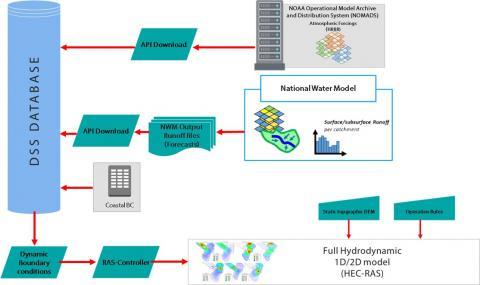
Community-Scale Flood Monitoring
Primary Investigator: Emad Habib
Primary Objectives:The Louisiana Watershed Flood Center is working with the Acadiana Planning Commission on designing a regional-scale flood monitoring system that serves the needs of the seven parishes of Acadiana.
Email Dr. Habib or check out the preliminary design for the system that has been developed here.
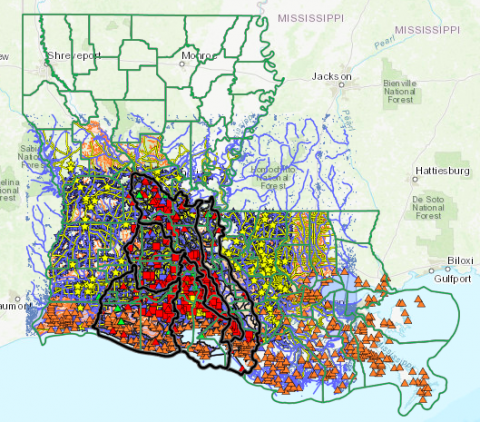
Paleo Perspectives on Climate Change
Primary Investigator: Brian Schubert
Primary Objectives: Establish robust baseline data for natural storm occurrences prior to human influence. Use stable isotopes from annual rings of living and fossil trees as a chemical fingerprint for extreme climate events (e.g., floods, droughts, heatwaves) of the past to inform our future actions.
Email Dr. Schubert or Visit his website here.
Water and Climate Sustainability
Primary Investigators: Emad Habib, JoAnne DeRouen, and Kari Smith
Primary Objectives: Assessment of Aquifer Storage and Recovery Feasibility Using Numerical Modeling and Geospatial Analysis. Impacts of Hydraulic Fracturing on Surface and Groundwater Water Resources.
Email Dr. Habib, Dr. DeRouen, Ms. Smith or vists the website to learn more here.
Effects of climate intensification and hydromodification on coastal flood risk, ecohydraulics, and biological population dynamics
Primary Investigator: Robert Miller
Primary Objectives: How does human activities affect water environments and vice-versa? How climate change enhances risk vulnerability even in protected areas? Use math-based approaches to support environmental management and shrink the footprint of unintended consequences.
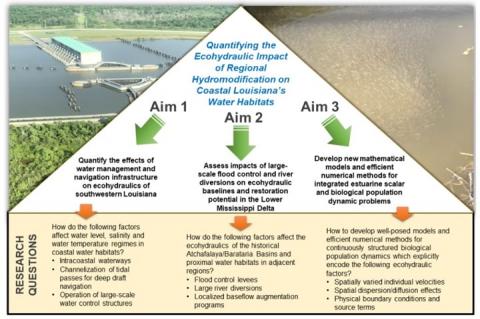
Flood Mitigation: Monitoring, Modeling and Forecasting
Primary Investigator: Emad Habib
Primary Objectives:Develop a regional gauge network for the eight-parish Acadiana region. Provide real-time data on flooding and extreme rainfall via a web-based public visualization interface.
Funding: US Army Corps of Engineers, USGS
Email Dr. Habib or visit the project's website to learn more here.
Climate change impacts on infectious disease
Primary Investigator: Loren Cassin Sackett
Primary Objectives: How does climate influence the distribution of pathogens? Does climate change expose naïve species to novel pathogens? Use whole-genome sequencing of animal populations to determine how species adapt to introduced pathogens.
Funding: National Science Foundation (NSF)
Email Dr. Sackett or visit her websire here.
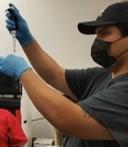
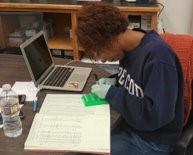
Sea Level Rise and Saltwater Intrusion
Primary Investigator: Paul Leberg
Primary Objectives: Fish responses to increased salinity and marsh fragmentation. Salinity interacts with marsh fragmentation the abundance to submerged aquatic vegetation to affect march fish abundance populations.
Email Dr. Leberg or visit his website here.
Phytoplankton ecology and effects of changing estuaries
Primary Investigator: Beth Stauffer
Primary Objectives: Effects of coastal ocean change on phytoplankton communities and impacts on ecosystems, food webs. The ecosystem effects on hurricanes.
Email Dr. Stauffer or visit her website here.
Zooplankton Ecology; Climate Change & Variability; Coastal Ocean Food Webs
Primary Investigator: Kelly Robinson
Primary Objectives: Impacts of short-term climate variability and long-term climate change on coastal zooplankton, their predators, and the broader food web. Effects of hurricanes on zooplankton abundance, distribution, and community structure.
Email Dr. Robinson or visit her website here.
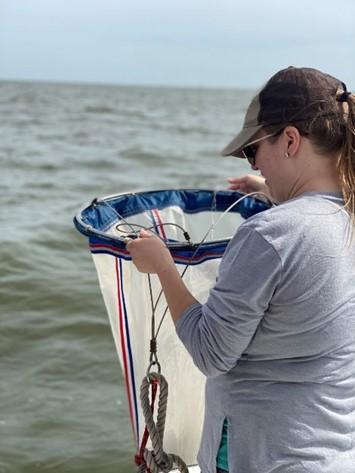
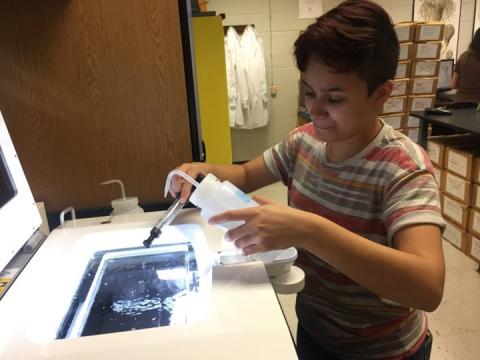
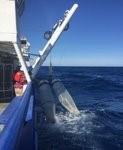
Prediciting organismal responses to climate change
Primary Investigator: Nic Kooyers
Primary Objectives: Harnessing adaptive variation in drought resistance strategies to manage popoulation under climate change. What variation exist in drought strategies? How does such variation correspond to evolutionary responses to a historic drought? What best predicts success during future droughts?
Email Dr. Kooyers or visit his website here.
Evaluation of assisted migration for mitigating impact of climate change
Primary Investigator: Nic Kooyers
Primary Objectives: Assisted Migration: Human assisted movement of species to threatened populations. Landscape-scale experiment to examine how assisted migration impacts traits, genomes, and fitness.
Email Dr. Kooyers or visit his website here.
Drone Based Remote Sensing of Coastal Louisiana
Primary Investigator: James Nelson
Project Objectives: Data analysis pipeline for processing and interpreting remote sensing data on coastal systems. Flooding impacts to infrastructure.
Funding Agencies: NOAA, National Science Foundation (NSF), and USACE
Climate Change: Stories from Isle de Jean Charles
Primary Investigator: Heather Stone
Project Objectives:Oral history interviews and archival research with tribes to tell their stories on how climate change has impacted their ancestral homes. Innovative environmental educational approaches.
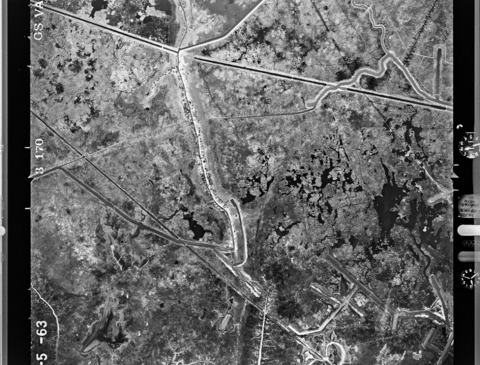
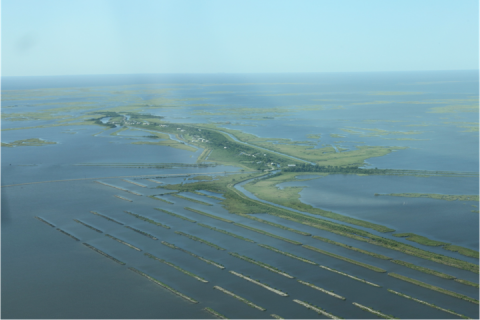
The Recent Louisiana Disasters Oral History Project
Primary Investigator: Liz Skilton
Project Objective: The interviews collected provide insight into how Louisianans react to disasters such as floods and mass casualty incidents and how these disasters shape individuals and communities’ years after their impact.
Email Dr. Skilton or visit her website here.
Enhancing Community Engagment in Flood Mitigation Using Hydrodynamic Modeling and Socio-Economic Risk Assessment
Primary Investigators: Emad Habib, Liz Skilton, Stephen Barnes, Anna Osland, Mohamed ElSaadani, and Trung Do
Project Objective: Lack of stakeholder understanding of flood risk as individuals (e.g. flooding of homes) and as a community (e.g., business interruptions) contribute to community disengagement from flood mitigation decision making, both at individual (e.g., buy flood insurance) and community levels (e.g., vote on stormwater fees).
Funding Agency: National Science Foundation (NSF)
Email Dr. Habib, Dr. Skilton, Dr. Barnes, Dr. Osland, Dr. ElSaadani, Dr. Do or visit the project's website to learn more here.
Development of barrier island habitat monitoring protocols
Currently, researchers at ICaWR are developing monitoring protocols to characterize plant communities and soil properties at barrier islands. These protocols are being tested at Louisiana barrier island restoration sites of different ages to determine methodological efficacy and restoration trajectories, with the ultimate goal of utilizing this monitoring protocol Gulf-wide.
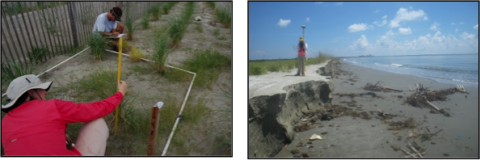
Importance of coastal islands for avifauna support
Since 2007, ICaWR researchers, in collaboration with Tulane University, the US Fish and Wildlife Service and the Louisiana Department of Wildlife and Fisheries, have studied the population ecology of brown pelicans on barrier islands of the Gulf of Mexico. This project is focused on how oil spills, hypoxia, coastal land loss, predators, and restoration approaches affect pelican demographics and population viability.

Louisiana coastal bays phytoplankton ecology
ICaWR researchers are investigating spatial and temporal patterns of phytoplankton biomass and community composition in the Atchafalaya-Vermilion Bay system. Using a combination of field sampling and lab-based experimentation, we are quantifying to what extent physical (e.g., light, salinity), chemical (e.g., nutrients), and biological (e.g., microzooplankton grazing) processes are controlling phytoplankton dynamics in these highly river-influenced estuarine environments.
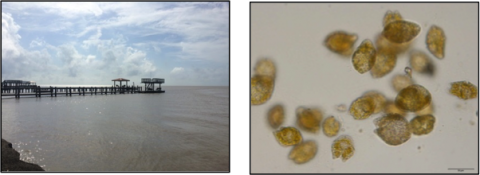
Saltmarsh loss disconnects habitats and reduces fish production
Using ecosystem scale experiments, ICaWR researchers have demonstrated that degradation of saltmarsh ecosystems decouples food webs that support the growth and production of important forage fishes. Although small and seemingly abundant, decreasing the production of these critical food web linking species can have major consequences for predatory fish that comprise recreational and commercial fisheries.
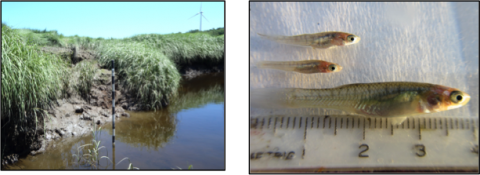
Wetland plant community dynamics modeling
ICaWR researchers are currently developing models of wetland plant communities that incorporate detailed representation of the ecology of over 30 plant species that characterize important habitat zones including fresh and salt water marshes, forest communities and barrier islands. These models are being used to explore how these communities may respond to anthropogenic and natural changes in the environment.
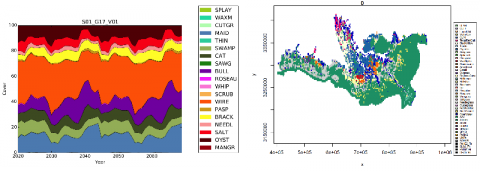
Coastal wetlands experimental research facility
ICaWR faculty and staff are developing a wetland research facility at the University’s Experimental Farm in Cade, Louisiana. The facility consist of eight experimental coastal wetlands (4 fresh and 4 brackish) that can be programmed with different tidal signals and are outfitted with wetland monitoring instrumentation maintained by ICaWR. This facility allows for student research projects on coastal wetland ecology a half hour from campus.
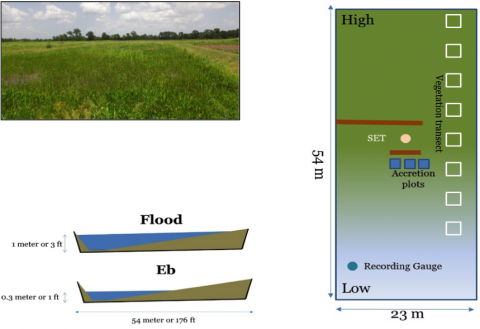
Accelerated degradation of petroleum hydrocarbons through bioturbation
This GoMRI funded project is a multidisciplinary collaboration (microbial ecology, invertebrate biology, analytical chemistry, environmental toxicology) looking at the interaction between sediment bioturbators, the microbial community, and oiled coastal sediment. It is assessing whether the presence of bioturbators results in an enhanced rate of petroleum hydrocarbon degradation.
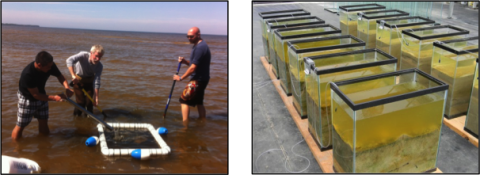
Assessment of oil spill effects on coastal archaeological sites
ICaWR researchers are assessing the effects of the 2010 Mississippi Canyon 252 Deepwater Horizon oil spill on prehistoric archaeological sites on the Louisiana Gulf Coast through a cooperative agreement with the Bureau of Ocean Energy Management. Samples have been collected from eight sites to examine the potential effects of hydrocarbons on artifacts, analytical techniques, and site formation processes, as well as long-term site preservation and future research costs for cultural resource management planning.
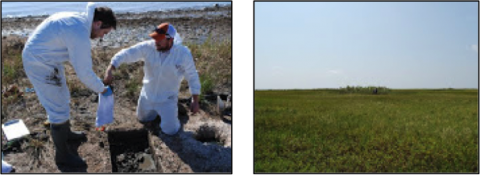
Development of surface water management framework
ICaWR researchers are working to understand both the human and natural science components that drive the availability, quality, and demand for freshwater resources in the Gulf Coast region. The goal of this project is to find creative and sustainable solutions for meeting our future water needs.
